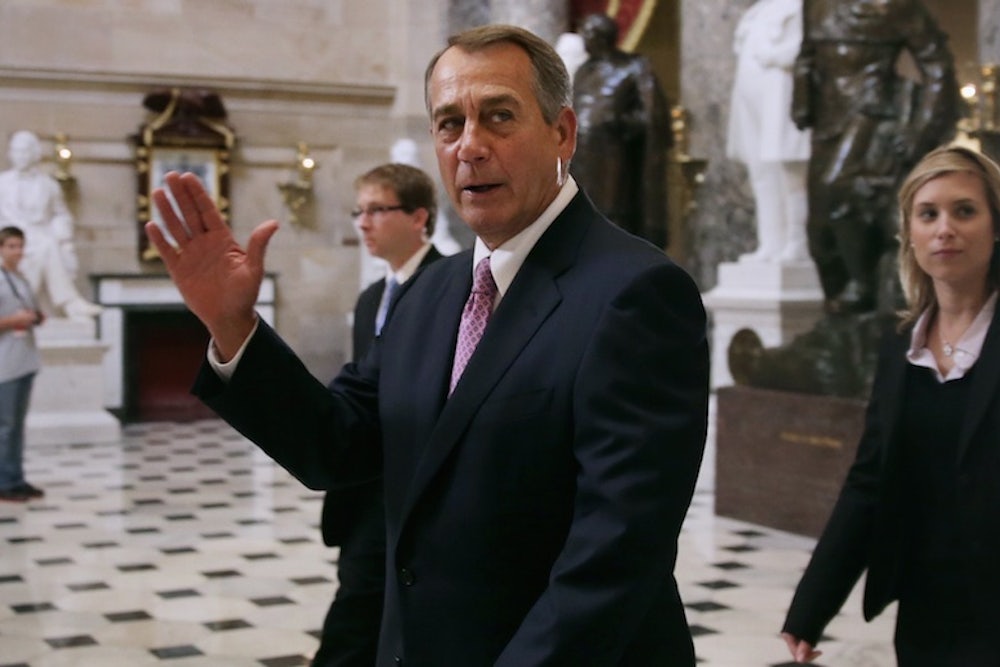House Speaker John Boehner went on ABC News “This Week” to make clear his position: Republicans won’t give the government new borrowing authority until Democrats agree to negotiate about Obamacare and fiscal priorities. When host George Stephanopoulos asked Boehner directly whether Republicans would let the government default if Obama won’t talk, Boehner said: “That's the path we're on. … I don't want the United States to default on its debt. But I'm not going to raise the debt limit without a serious conversation about dealing with problems that are driving the debt up. It would be irresponsible of me to do this.”
Of course, this is what Boehner has always said publicly. Privately, he has been saying something else. According to multiple media accounts, Boehner has told colleagues he will make sure Congress passes a bill to raise the debt limit, even if he has to rely on Democratic votes to do so. Many pundits think Boehner’s public statements represent nothing more than posturing—an effort to keep his conservative critics at bay, so that he can tell them honestly he wanted until the last moment before agreeing to raise the debt ceiling for the sake of the country.
Which John Boehner is telling the truth—the one talking to Stephanopoulos? Or the one talking to his colleagues? Your guess is as good as mine. It may also be as good as his.
Boehner seems unsure of what he wants to do. That's unsettling. He seems less sure about what he can do. That's even more unsettling. If you want proof, go and read Friday’s New York Times story by Jonathan Weisman. As it explains, Boehner has on at least two recent occasions promised to pass spending bills, only to fail because the conservative wing of his party wouldn’t support him. That’s why the government is shut down right now. And if Boehner can’t get the Republican caucus behind him on a bill financing basic government operations, who’s to say he can get the Republican caucus to vote for a bill raising the debt limit? And that's assuming he wants such a vote.
I know: It’s pretty confusing. But that wasn’t the most important part of Boehner’s interview. The most important part was the argument Boehner made for why Obama and the Democrats must start talks over the debt ceiling. It’s actually the best argument yet for why they shouldn't.
The key exchange takes all of 22 seconds, starting at about 12:25 in the video above. It goes like this:
STEPHANOPOULOS: What the president says is he believes that the consequences of negotiating again over a debt limit and re-creating a cycle of crises are worse.
BOEHNER: Every president in modern history has negotiated over a debt limit. Debt limits have been used to force big policy changes in Washington. And guess what, George? They're going to be used again.
Boehner is wrong on the history. Congress has increased the debt limit in the course of passing other legislation—the Center on Budget and Policy Priorities has a nice review of recent legislation—and sometimes one or the other party made a big fuss about it. But, as Thomas Mann and Norman Ornstein explain in their acclaimed book, It’s Even Worse Than It Looks, until recently officials in neither party seriously threatened to let the government default on expenses it had already incurred:
Pyrotechnics and symbols aside, on every occasion on which the government needed to raise the debt ceiling, the key actors in Washington, including presidents and congressional leaders, knew that almost nobody—until now—had any intention of precipitating a default. Leaders of the president’s party told us privately on the eve of more than one ostensibly nail-biting vote, including in 2002, that they knew in advance that their counterpart’s members, along with some of their own antsy colleagues, were willing to switch if it looked as if the debt limit vote might actually fail with the deadline looming.
Eventually, the authors note, leaders from the two parties started invoking what became known as the Gephardt rule (named for Richard Gephardt, former Democratic leader in the House). Under the Gephardt rule, the debt limit went up just as soon as the budget resolution passed. But Republicans repealed the Gephardt rule in 2011, right after taking power. A few months later, they were threatening to allow default if Obama didn’t meet their demands.
Obama ended up negotiating, but he’s since vowed never to do that again. The danger, he says, is that parties would routinely start demanding policy concessions in exchange for a higher debt limit. Republicans could demand lower capital gains taxes or restrictions on abortion. Democrats could insist on stricter gun laws or higher taxes on the rich.
Such demands would be outrageous, under those circumstances, but the threat of default—with serious damage to America's credit-worthiness and to the economy—would loom as the alternative. "Imagine you have a labor union negotiating with management over wages," says Ornstein. "There is the underlying threat of a strike, but most often it becomes a spur to agreement. Now imagine the union says that if they don't get their demands they will blow up the plant--and mean it. That is what we have now. It is indeed unprecedented and way over the line."
This is extortion, plain and simple. The only question is whether it becomes the standard method of setting fiscal policy. Boehner's quote suggests it is about to do so—which is why, for the sake of functional democracy, he and his colleagues must not prevail.
